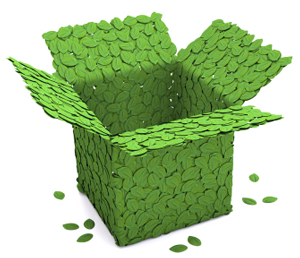The effort to “go green” has become a commitment not only for B Corporations such as AMS Fulfillment, but across the supply chain. Consumers want to buy green and as a result, corporations have begun committing to sustainability. “Going Green” is growing in importance across many industries. From warehouse technology to transportation to manufacturing and packaging we see a new way of thinking that considers environmental impact in decision-making.
** ** **
 Supply chain sustainability is here to stay
Supply chain sustainability is here to stay
Amanda Loudin / Supplychain247.com
The supply chain is undoubtedly getting greener thanks to corporate commitment and the right technology.
August 2022 – When the pandemic hit in March 2020, many companies had to scramble to keep operations in motion. Employees were sick or wanted to stay home if possible, manufacturing stalled in many places, and at the same time, consumers turned to e-commerce for anything and everything. It was a perfect time for companies to let their goals for sustainable supply chains slide.
Yet, despite all the challenges, the 2021 “State of Supply Chain Sustainability” report, put together by the MIT Center for Transportation & Logistics and the Council of Supply Chain Management Professionals (CSCMP), found that most companies kept their eyes on the ball with regard to sustainability.
The survey results indicated that, even during the toughest lockdowns, 80% of respondents didn’t change course with their sustainability goals. Some 83% of executives went so far as to say that the pandemic either accelerated sustainability activity, or at the very least, increased their awareness of it.
What’s driving this focus? Numerous factors.
Nathan Wolf, vice president of sales at TGW Logistics, says the company’s efforts are both customer-driven and corporate-responsibility driven. “Because sustainability is becoming such an important topic for our customers, we want to support their goals to earn the honor of being their partner of choice for warehouse automation,” he says. “It’s hard to deny that, to some extent, customers are spurring us forward in sustainability.”
Wolf adds that the logistics industry is placing increasing emphasis on sustainability goals. “We’re seeing that sustainability is becoming more and more of a priority,” he says. “Businesses are very concerned with maintaining viability, and so they’re looking for future-proof solutions for their warehouses.”
TGW has its own sustainability goals, according to Wolf. “There’s already a natural alignment to our values and our foundation-owner’s philosophy,’” he says. “We believe taking good care of the ecological impacts and social aspects of our business allows us to be successful, while contributing to the creation of a better world. Our value system pushes us to think about the long-term orientation and the sustainable development of TGW and its customers.”
The efforts surrounding sustainability in the supply chain run across a spectrum, and the “State of Supply Chain Sustainability” report went so far this year as to add a classification system of the involved companies based on their behaviors related to sustainability.
The range went from low-effort enterprises with little engagement to highly committed leaders. Sustainable outcomes, according to the report, hinged on this level of engagement.
Data from the report also revealed that, like TGW, much of the drive for sustainability originated within the company itself. Only 8% of respondents said pressure from investors grew over the past year. Yet 59% said they had invested in supply chain sustainability over the same period.
This is a far cry from just five to 10 years ago, when most companies first got involved to achieve growth goals and improve market perception, according to the findings of the “2022 Sustainability Report,” which digital manufacturer Protolabs commissioned.
Sustainability efforts, it appears, now extend beyond lip service.
Read the full article at Supplychain247.com.